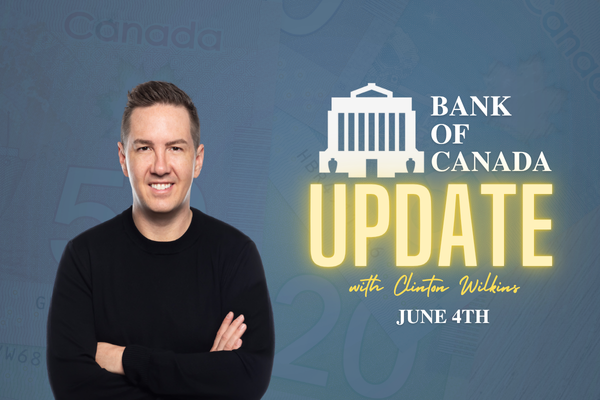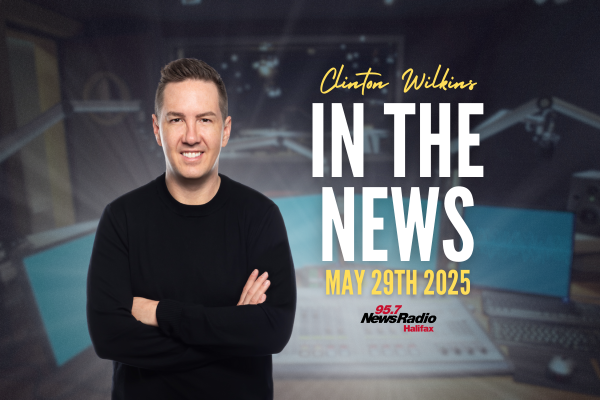Clinton Wilkins joins Todd Veinotte on 95.7 News Radio to discuss The Bank of Canada holding its key policy rate at 2.75%, marking the first pause after seven consecutive cuts.
Global News Morning: Financial Literacy Month
Global News Morning: Financial Literacy Month
Clinton Wilkins and Chris Turcotte sit down with Alyse Hand to have a Global News morning financial literacy discussion!
Don’t feel like watching the video? Check out the credit advice video transcript below. Global News Morning Financial Literacy Month.
Transcript:
Credit advice
Alyse Hand: [00:00:00] November is Financial Literacy Month, dedicated to improving the financial well-being of Canadians. So we thought it’s the perfect time to bring in our friend Clinton Wilkins senior mortgage adviser, and Chris Turcotte, president of Centum Financial, to share their advice on income, assets and credit to help consumers better understand their finances. We’re almost at the end of Financial Literacy Month, guys, so you just made it in on time. Thanks for being here.
Chris Turcotte: [00:00:25] Thanks for having us!
Alyse Hand: [00:00:26] Chris and Clinton. Chris, a new face to our show, but we know Clinton. So thanks again. Great to meet you, Chris.
Clinton Wilkins: [00:00:32] Thanks for having us.
Talking about credit
Alyse Hand: [00:00:33] All right. So let’s start with credit. The big C word, we always think about this when we think of financial literacy, it’s really important to think about building that credit, Right?
Clinton Wilkins: [00:00:41] Yeah, 100 percent. Mortgage lending is really tied to credit. And there are solutions for everyone depending on where they are on the credit matrix, and we really talk to consumers about “how do they maintain good credit?” It’s really around payment history. It’s around balances compared to limits and really around their credit mix. I think November is a perfect time to really look at your credit. I think credit monitoring is super important and especially when you’re going in to buy a home or refinance or renew, credit really does come into play.
Alyse Hand: [00:01:12] Could you tell me, I wanted to know this on average, how many credit cards should one have? I know every situation is different. Let’s talk to you, Chris, about that. Do you think it’s important to have two, three, one? What do you think?
Is there a “right” number of credit cards?
Chris Turcotte: [00:01:24] I think more than the number, it’s credit management. So it’s how much credit you have versus how much you use. And you talked about credit health, and no, I still haven’t used trigonometry, but we don’t teach credit in school yet. So the rule of thumb, what capacity of your current credit are you using?
If you have a $10,000 credit card, are you always hovering near that limit, or are you managing it and paying it off every month? Paying it off every month shows the Equifax and TransUnion that you can manage your credit accordingly and your score goes up accordingly, showing that you’re good with the credit that you’re granted.
Alyse Hand: [00:01:59] So if you’re really good at paying it off, hey, build that credit and have a few cards. If you’re struggling, keep it to one and maybe put it in an ice block in your freezer and don’t touch it. Right.
Clinton Wilkins: [00:02:08] I think that’s always a solution. And you’re going to the holidays, it’s a challenging time.
Alyse Hand: [00:02:11] It is.
Clinton Wilkins: [00:02:12] But I think, you know, talking about credit opening your bills, especially if you’re a couple in a household, I think it’s so, so important.
Talking more about income
Alyse Hand: [00:02:18] Exactly. All right, I want to talk about income, too. That’s something that I know you both are talking about a lot this month, financial literacy month. So what do you consider when you think income for someone who’s coming in to buy a home, Clinton? What sort of things do you tell them? You can also look outside of what that income reads on a statement right?
Clinton Wilkins: [00:02:37] Yeah, exactly. So there’s lots of different solutions. More and more Canadians are becoming self-employed all the time. And there’s lots of great programs for self-employed borrowers as well. Typically, when you’re self-employed, we’d look at it to your average of your income. But there are some other programs available, you know, stated income programs when you’re buying a home and also refinancing, that can certainly come into play. Typically, when someone is employed with an employer, we look at their salary or if they’re on a variable income, we may look at it to your average as well.
Alyse Hand: [00:03:06] What else? When someone comes in looking for a mortgage or are considering our finances and keeping them in order? What do you give people as advice, Chris, when they’re coming in to see you?
Advice for future home owners
Chris Turcotte: [00:03:15] Well, I think there’s advice of living within your means. But I think more importantly, with Christmas coming, everything else, it’s so critical now that you have an unbiased mortgage professional, like we’ve all worked for banks, you know, but I’m paid to make sure you walk out with the bank’s product. We’re talking about the most intimate part of your life, your financial history. You’re making the largest purchase of your life. You need that unbiased mortgage professional that’s not working for the bank, they’re working for you to really guide you through that process.
Mortgage broker?
Alyse Hand: [00:03:42] All right. So that, of course, both of you not working for banks. What is, and I think that is the big question I think a lot people have what is the big difference coming in to see you versus going to a bank? Other than that, that bias that the bank is trying to sell you sort of a product. What other benefits are there of seeing someone like you?
Clinton Wilkins: [00:03:58] Well, I think there were bias to the consumer. At the end of the day, we’re in a relationship business. I think that we will lend the consumer to the lender for a certain period of time, and then we’d like to get involved again when the mortgage comes up for renewal. So many things change in people’s lives, whether it’s a marital breakdown, health issues, change of jobs, change of situation.
And I think just being in touch with someone that can really help, I think it’s important with us. We have access to about 40 different lenders, not every lender is for every consumer. Know the primary basis of our business is normal bank business, triple A. But there are other solutions out there because not every consumer that might work with. So I think that you know, really seeking that advice for your biggest purchase and the mortgage is the biggest debt of your life. I think going to an unbiased mortgage professional is really the best solution.
Advice for the first time home buyer
Alyse Hand: [00:04:45] Most likely will be, of course, your biggest debt. You’ll have the biggest loan to pay off. I’m going to give you the final word, Chris. Financial Literacy Month. Best advice you have for someone out there this morning that perhaps is struggling with finances or perhaps just a young person watching how to set them for success financially in the future.
Chris Turcotte: [00:05:02] One hundred percent because like we mentioned, they’re not teaching this in school, which is mind-blowing, right? So always live within your means. Pay yourself first. That’s the big one, pay yourself first. Make sure that you’re putting into your savings, make sure you’re paying your bills. You get what’s ever left, whatever’s leftover. No one else is gonna put you first in your financial situation. Then when you go to lend, I think the perfect way to cap it would be, you know, it’s your financial situation, are you really going to go for one option or do you want to make sure that you understand the entire landscape? And I think that’s what’s most important.
Global News Morning Financial Literacy Month
Alyse Hand: [00:05:33] I’ve got to leave it there. Thanks, guys.
Clinton Wilkins: [00:05:35] Thanks for having us.
Alyse Hand: [00:05:36] Appreciate it. Clinton welcomes Chris Turcotte. Appreciate you coming in this morning.
Looking for more information or other mortgage application advice? Feel free to contact us!


